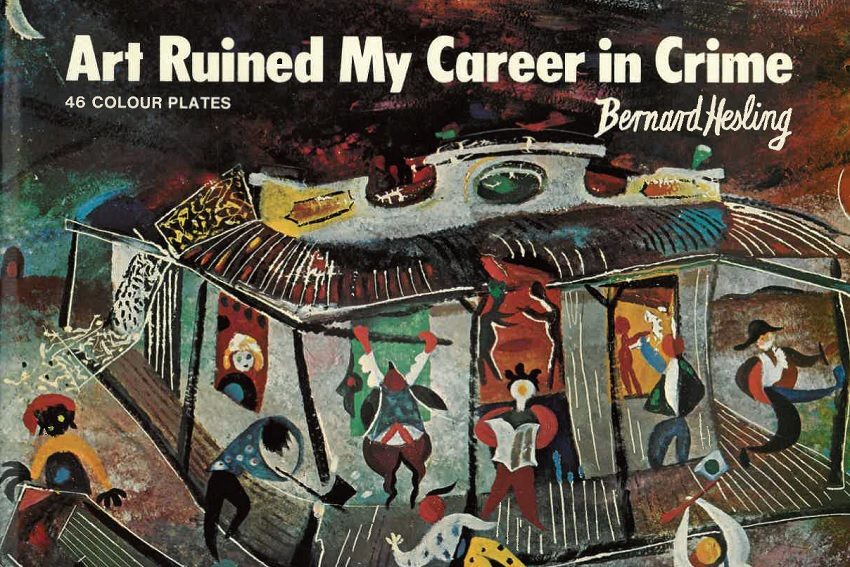Third Age: Remembering Bernard Hesling

Shirley Stott Despoja remembers the forward-thinking artist, author and raconteur that was Bernard Hesling, and asks whether Jelena Dokic’s crushing autobiography will teach us anything.
Some third agers who read this column will remember with affection the great Bernard Hesling OAM (artist — pioneer of vitreous enamel murals — raconteur, author and eccentric). Some of his works were fired in Adelaide’s old Simpson factory among the refrigerator doors. The late John Miles (another name to conjure with), journalist and columnist, called him one of the funniest, wittiest, most widely talented, highly civilised men in Adelaide and Australia. Former arts editor Tim Lloyd wrote a good obituary when Bernard died in the late ‘80s, and there is a jolly lively Wikipedia record of his life.
My affection for him has never waned. He stood up for me in the ‘60s when I was a young writer, new to Adelaide and its ways (which means I had no idea of who was who or why it mattered). I was brave and sometimes unwise in those days. Bernard liked that.
A grouchy author accused me of being “un-Australian” in some precursor of Writers’ Week, when I defended my newspaper’s coverage. I burst into flames, which I did in those days, and demanded an apology. Some of Adelaide’s grander people laughed behind their hands. So I saw a lawyer. But it was Bernard who sorted it out, got up in a meeting and spoke for me. I got the apology. It was really the first big bust-up of a career that had a few more bust ups ahead, always to do with my refusal to be put down, wiped off as the little, importunate girly in the pink skirt. Bernard could probably see a future in which young female critics would not be treated this way if they challenged men in public meetings.
I bought one of his enamelled dishes with my first decent pay packet, and went to his shows, read his books and understood his wacky sense of humour.
I had run across him long before I came to Adelaide when he had a little spot on Sydney TV, before the ABC news, I think, in which he recounted, in hilariously witty ways, the strange madness of modern life, especially the needlessly complicated ways of bureaucracy. My favourite was about “getting an easement”, remembered still despite the passage of 60 years or so.
I think of him often but no more so than when I have to negotiate the labyrinthine ways of such as MyAgedCare, the new way of getting help if you are old and need it. The government may have been well intentioned when it began changing how such welfare is delivered to us oldies, but many of us, still in full possession of our faculties, and those who are administering it, are finding it hard going. Bernard, author of Around the World on the Old Age Pension, would have done a marvellous piece on it.
I also think of Bernard when, in my house, I pass two or three of his vitreous enamel plates mounted on legs. Bernard said that “with the legs kicked from under them they became art” (in Art Ruined My Career in Crime) as though we ever doubted this. Another is mounted on the wall and seems to wink at me as I pass.
Bernard could see the madness we were heading for; where everything is 10 times more complicated that it need be, such as getting an easement, a new phone, or some help from MyAgedCare or Centrelink. But he died and went to university. He said he’d always wanted to go to university and by bequeathing his body to the university, he did just that.
***
Former tennis star Jelena Dokic’s autobiography, Unbreakable, is one of the most painful I have ever read.
From tennis child prodigy to adulthood, she was under the control of a man who beat her, spat at her, robbed her and tortured her. He was the father whom she could never please nor appease and from whom she could not, as a child and even beyond, escape.
And yet it happened almost in plain sight. So many people knew, so many guessed, some of what was happening to her. They saw the welts and bruises and sat on their hands, held their tongue. Jelena denied it, so what could they do?, they asked.

Hopefully, we have learnt a lot since those days. And it could be good to hear from those tennis officials who believed they could not help her because they held beliefs that we know now are dangerous: that you can’t intervene in families. And, after all, hadn’t she denied the abuse in court?
Sickeningly, it wasn’t until this horrible man, her father, threatened an Australian ambassador overseas, that he was sent to gaol. Not for the crimes he was still committing against his child.
Jelena has written courageously about what happened to her, although she knows that some people will still ask, “Why didn’t she? Why didn’t they…?” because they haven’t caught up with present understanding of control and powerlessness in families, and, indeed, wherever there is an imbalance of power in important relationships.